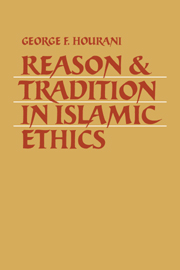Book contents
- Frontmatter
- Contents
- Preface
- Foreword by Michael Marmura
- Conventions
- Titles and locations of the original articles
- Introduction
- 1 Islamic theology and Muslim philosophy
- 2 Ethics in classical Islam: a conspectus
- 3 Ethical presuppositions of the Qurʾān
- 4 ‘Injuring oneself’ in the Qurʾān, in the light of Aristotle
- 5 Two theories of value in early Islam
- 6 Islamic and non-Islamic origin of Muʿtazilite ethical rationalism
- 7 The rationalist ethics of ʿAbd al-Jabbār
- 8 Deliberation in Aristotle and ʿAbd al-Jabbār
- 9 Ashʿarī
- 10 Juwaynī's criticisms of Muʿtazilite ethics
- 11 Ghazālī on the ethics of action
- 12 Reason and revelation in Ibn Ḥazm's ethical thought
- 13 The basis of authority of consensus in Sunnite Islam
- 14 Ibn Sīnā's ‘Essay on the secret of destiny’
- 15 Averroes on good and evil
- 16 Combinations of reason and tradition in Islamic ethics
- Select bibliography
- Index
4 - ‘Injuring oneself’ in the Qurʾān, in the light of Aristotle
Published online by Cambridge University Press: 13 October 2009
- Frontmatter
- Contents
- Preface
- Foreword by Michael Marmura
- Conventions
- Titles and locations of the original articles
- Introduction
- 1 Islamic theology and Muslim philosophy
- 2 Ethics in classical Islam: a conspectus
- 3 Ethical presuppositions of the Qurʾān
- 4 ‘Injuring oneself’ in the Qurʾān, in the light of Aristotle
- 5 Two theories of value in early Islam
- 6 Islamic and non-Islamic origin of Muʿtazilite ethical rationalism
- 7 The rationalist ethics of ʿAbd al-Jabbār
- 8 Deliberation in Aristotle and ʿAbd al-Jabbār
- 9 Ashʿarī
- 10 Juwaynī's criticisms of Muʿtazilite ethics
- 11 Ghazālī on the ethics of action
- 12 Reason and revelation in Ibn Ḥazm's ethical thought
- 13 The basis of authority of consensus in Sunnite Islam
- 14 Ibn Sīnā's ‘Essay on the secret of destiny’
- 15 Averroes on good and evil
- 16 Combinations of reason and tradition in Islamic ethics
- Select bibliography
- Index
Summary
The Qurʾān frequently says of sinners anfusahum yaẓlimūn or something similar. The usual interpretation of the expression is ‘They wrong themselves’, but this raises problems. Is it possible for anyone to wrong himself? If it is, are sinners likely candidates for wronging themselves? And does the Qurʾān assert or suggest that these people suffer any wrong? Although these problems have been perceived in varying degrees by medieval and modern commentators (most recently by Kāmil Ḥusayn in Egypt), I believe that a sharper understanding of them is possible when once we have understood what Aristotle had to say about injustice to onself in the Nicomachean Ethics, Book V, chapters 9 and 11. I shall therefore begin with a short account of Aristotle's reasoning and conclusions on this question, to the extent that they can lay the ground for a fresh interpretation of the Qurʾān.
Aristotle distinguishes two main senses of the Greek verb adikein (chs. 1–2). One is a general sense, ‘wronging’ (followed by a direct object for the person wronged, as in English ‘wronging someone’). In this sense we call wrong those acts which go against the aims of the laws, which are ‘to produce and preserve happiness and its components for the political society’ (ch. 1, 1129b 17–19): such acts as desertion and fleeing in war, adultery, assault and slander (1129b 20–3).
- Type
- Chapter
- Information
- Reason and Tradition in Islamic Ethics , pp. 49 - 56Publisher: Cambridge University PressPrint publication year: 1985
- 1
- Cited by

